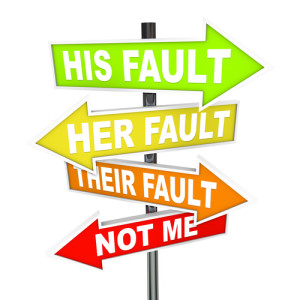Did Monster Energy Make A ‘Dope’ Contract With DJ Z-Trip? Nope (Forbes Cross-Post)
What is the legal meaning of the word “Dope”? Monster Energy argued that the word “Dope!” granted it permission to publish copyrighted material. The court says nope.

Photo credit: Several colorful arrow street signs with words Not Me – His, Her and Their Fault // ShutterStock
The court describes the conversations between Monster Energy and Z-Trip:
Conversation #1: Monster Energy says it asked Z-Trip in person if he had any music they could include in their promotional video. Z-Trip allegedly replied that he had made a remix available on his website and it could be downloaded for free. “Downloaded for free” is an ambiguous statement: anyone could download the mix without payment, but that doesn’t mean it was “free” of copyright restrictions on republication.
Conversation #2: Monster Energy says it told Z-Trip in person it was making a video and wouldn’t republish it until he was satisfied. Monster Energy claims Z-Trip agreed to that.
Conversation #3: Monster Energy emailed a link to the video draft including the remix and said “Please have a look at the video from this past weekend and let me know if you approve.”
Conversation #4: Z-Trip replied to the email saying “Dope!” and suggesting some minor formatting changes. Monster Energy’s representative testified that “he understood the word ‘Dope’ to ‘indicate[] [Z-Trip’s] approval of the entire Video and all elements, including the use of his Megamix and his image.'” Another logical interpretation is that Z-Trip was happy with the video’s presentation of him, but his email didn’t address copyright permissions at all.
There are two stories to tell about Monster Energy’s conduct here. The first story is that Monster Energy heard what it wanted to hear from Z-Trip, rather than hearing what Z-Trip was actually saying. The second story is that Monster Energy sloppily screwed up in clearing the copyrights for its videos, and it tried to create a post hoc excuse for its mistake.
Either way, Monster Energy’s arguments go nowhere in court. In a scholarly yet scathing opinion, the judge says that the contract failed the requirements of Contracts 101 because Monster Energy never made an offer, Z-Trip never accepted, any contract lacked consideration, and even if formed, the contract wouldn’t have included permission to republish the remix. With respect to the meaning of Z-Trip’s “Dope!” remark, the court says (with the straightest face possible):
In proper context, the word “Dope!” could certainly be taken as an expression, albeit unorthodox, of approval and acceptance of another’s antecedent offer….There is no fair reading of the facts under which Z-Trip, by exclaiming “Dope!,” accepted such a contractual offer. Z-Trip’s locution, although memorable, was entirely too enigmatic and elliptical to constitute the “clear [and] unambiguous” acceptance necessary for contract formation.
(I always love it when judges parse the import of slang and colloquialisms in formal legal terms).
Some lessons from this lawsuit:
1) Copyright infringement is strict liability. It’s copyright infringement to publish someone else’s material without permission, even if the publisher worked hard to clear all of the necessary rights. In other words, there’s no “I didn’t know” defense to copyright infringement. Here, it’s an obvious rookie error to believe that a DJ remixer could grant copyright permission to use the remixed music, and the court seems unimpressed by Monster Energy’s mistake. The court calls Monster Energy’s decision to delegate the copyright permission process to an inexperienced employee “reckless” and “perforce unreasonable.”
2) Forming a contract should be a ticker-tape parade. Forming a contract should be a Big Deal, with lots of pomp-and-circumstance as the parties put pen to paper because everyone fully understands that they are taking a major and legally significant action. Contract law has numerous equitable bailouts for situations where that doesn’t occur, but no business should ever rely upon the bailouts.
3) Every word matters to contract law. One of my favorite modern contracts cases is CX Digital Media v. Smoking Everywhere, a 2011 ruling where the parties exchanged a series of instant messages discussing additional advertising opportunities, with the final IM saying the single word “Awesome!” The court held that “Awesome!” signified acceptance of an amendment to the contract worth over $1.2 million. In that case, “awesome” was a million dollar word.
This case illustrates how litigants may make pathetically tendentious interpretations of the parties’ words in a desperate effort to create a contract after-the-fact. We can’t really live our lives in perpetual fear that every person we send email to will misread our emails as forming some type of contract, but no doubt it’s good hygiene to be as clear as possible in every email you write.
4) Don’t blame your business partners for your mistakes. The court says:
It is, in fact, quite unseemly for Monster, rather than taking responsibility for its own lack of care, to argue now that any liability it may have to the Beastie Boys in copyright was somehow a product of a fraud perpetrated by a disk jockey, Z-Trip.
Monster Energy seemed quick to blame Z-Trip for its copyright clearance mistake. Not only does deflecting the blame seem childish, but Monster Energy made Z-Trip waste his time and money just because he had been willing to do them a favor. Monster Energy’s business relies heavily on endorsements and promotions from celebrities and other famous personalities, yet I can’t imagine why anyone would be willing to work with Monster Energy in the future–lest they become the next victim of Monster Energy’s willingness to freely throw its business partners under the bus.
Case Citation: Beastie Boys v. Monster Energy Company, 2013 WL 5902970 (S.D.N.Y. November 4, 2013)
